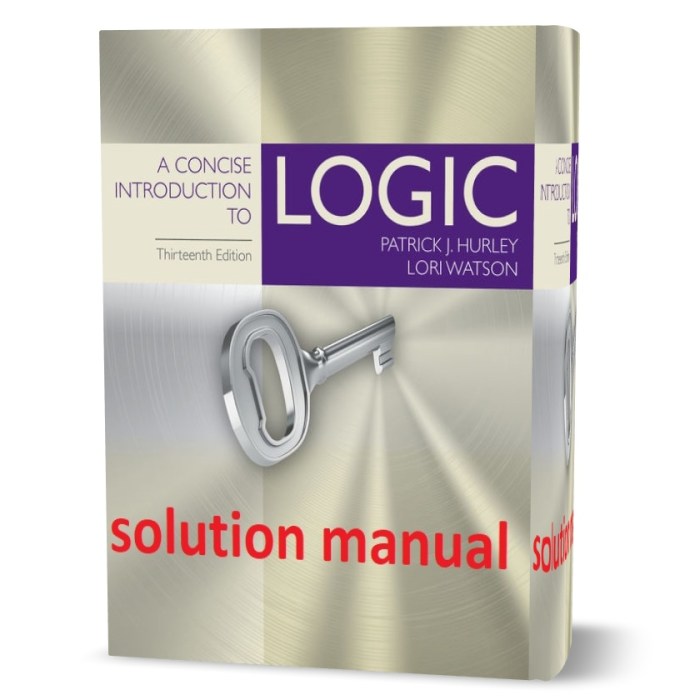A concise introduction to logic 12th edition – Delving into “A Concise Introduction to Logic, 12th Edition,” readers embark on an enlightening journey through the intricate world of logical reasoning. This comprehensive guide unveils the fundamental principles of logic, providing a solid foundation for critical thinking, problem-solving, and effective communication.
From the outset, this introduction captivates with its clear and engaging exposition of logic’s nature and significance. It traces the historical evolution of logical thought, highlighting its profound impact on diverse fields of inquiry.
1. Overview of Logic

Logic is the systematic study of reasoning and argumentation. It provides tools for analyzing the validity of arguments, identifying fallacies, and drawing sound conclusions. Logic is essential for clear thinking, effective communication, and problem-solving in various fields.
Historical Context, A concise introduction to logic 12th edition
The origins of logic can be traced back to ancient Greece, with philosophers such as Aristotle making significant contributions. Over the centuries, logic has evolved, incorporating new ideas and applications in fields like mathematics, computer science, and linguistics.
Importance and Applications
- Ensures the validity of arguments and conclusions.
- Identifies and corrects fallacies in reasoning.
- Provides a framework for problem-solving and decision-making.
- Enhances critical thinking skills and intellectual rigor.
- Has applications in diverse fields such as law, medicine, and artificial intelligence.
2. Propositional Logic
Propositional logic deals with the relationships between propositions, which are statements that are either true or false. It introduces logical connectives (and, or, not, implication, equivalence) and truth tables to evaluate compound propositions.
Truth Tables
Truth tables provide a systematic way to determine the truth value of a compound proposition based on the truth values of its constituent propositions.
Logical Equivalence and Implication
- Logical equivalence: Two propositions are logically equivalent if they have the same truth value for all possible combinations of truth values of their constituent propositions.
- Logical implication: One proposition logically implies another if it is impossible for the first proposition to be true while the second proposition is false.
3. Predicate Logic

Predicate logic extends propositional logic by introducing predicates (properties of objects) and quantifiers (for all, there exists). It allows for more complex and expressive statements about the world.
Domain of Discourse
The domain of discourse is the set of objects that the predicates and quantifiers refer to. It affects the validity of logical statements.
Rules of Inference
- Universal instantiation: Inferring a statement about a specific object from a statement about all objects.
- Existential generalization: Inferring a statement about all objects from a statement about a specific object.
- Modus ponens: Inferring a conclusion from a premise and a rule of implication.
4. Argument Analysis
Argument analysis involves evaluating the validity and soundness of arguments. Arguments consist of premises (supporting statements) and conclusions (claims being made).
Deductive and Inductive Arguments
- Deductive arguments: Premises logically imply the conclusion; if the premises are true, the conclusion must also be true.
- Inductive arguments: Premises provide evidence for the conclusion; if the premises are true, the conclusion is likely to be true, but not necessarily so.
Fallacies
Fallacies are errors in reasoning that lead to invalid arguments. Common fallacies include ad hominem (attacking the person), straw man (misrepresenting the opponent’s argument), and slippery slope (assuming a series of unlikely events will inevitably occur).
5. Applications of Logic

Logic has numerous applications in various disciplines, including:
Computer Science
- Formal verification of software and hardware designs.
- Development of artificial intelligence systems.
- Design of programming languages and databases.
Mathematics
- Proofs of mathematical theorems.
- Development of set theory and model theory.
- Analysis of mathematical structures.
Linguistics
- Analysis of natural language syntax and semantics.
- Development of formal languages for communication.
- Machine translation and natural language processing.
6. Advanced Topics: A Concise Introduction To Logic 12th Edition

Advanced topics in logic include:
Modal Logic
Studies the logic of necessity, possibility, and belief.
Temporal Logic
Deals with the logic of time and temporal relationships.
Non-Classical Logic
Extends classical logic by introducing alternative truth values, such as fuzzy logic and intuitionistic logic.
Philosophical Implications
Logic has deep philosophical implications, raising questions about the nature of truth, knowledge, and reality.
FAQ Resource
What is the primary focus of “A Concise Introduction to Logic, 12th Edition”?
The primary focus of this book is to provide a comprehensive introduction to the fundamental principles of logic, including propositional and predicate logic, argument analysis, and advanced topics.
How does this book enhance logical reasoning skills?
Through clear explanations, engaging examples, and practice exercises, this book equips readers with the tools and techniques to analyze arguments, identify fallacies, and construct sound logical inferences.
What are the applications of logic discussed in this book?
This book explores the applications of logic in various fields, including computer science, mathematics, linguistics, artificial intelligence, and knowledge representation.